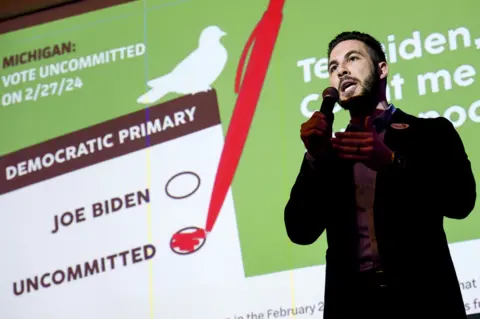While enjoying ice cream with a late-night television talk show host on Monday, US President Joe Biden suggested the possibility of a new ceasefire in the Gaza War, hinting that it might materialize as early as the upcoming Monday.
“I’ve been informed by my national security adviser that we are nearing an agreement,” he mentioned.
However, the White House later tempered these remarks, causing disappointment among many in the American Palestinian community.
Then, on Tuesday night in Michigan, a pivotal battleground state in the November presidential election, over 100,000 people participating in the Democratic primary cast their votes for “uncommitted” as part of a protest orchestrated by pro-Palestinian groups.
Lexis Zeidan, one of the organizers, highlighted on Tuesday night, “This serves as a warning sign.”
This week has served as a reminder to President Biden that the ongoing turmoil in the Middle East, coupled with the White House’s response, carries potential electoral risks. Since the commencement of the conflict following the October 7 attacks, the president has grappled with the challenge of navigating Middle East policy decisions that may not resonate well with key segments of his coalition.
Despite facing domestic pressure this week, the Biden administration remains cautious about making substantial shifts in policy. At a Thursday briefing, Matt Miller, the Press Secretary for the US State Department, emphasized the administration’s commitment to providing aid to Israel, supporting the nation’s “legitimate right” to self-defense and preventing a recurrence of incidents like those on October 7.
Miller addressed the misconception that the United States can dictate sovereign decisions to other countries, stating, “There is a mistaken belief that the United States is able to dictate to other countries sovereign decisions. Israel makes its sovereign decisions, and we make clear where we disagree with them.”
According to information provided on background, US officials are contemplating the possibility of postponing additional arms shipments to Israel, among other potential measures.

While most opinion polls indicate overall support for Israel in the conflict among the American public, key segments of Mr. Biden’s Democratic coalition, such as young voters and people of color, diverge in their perspectives. This divergence adds complexity to domestic political considerations, forcing the administration to navigate and balance the interests of various constituencies within the Democratic Party, each claiming significance for the president’s re-election.
Pro-Palestinian groups in the US are advocating for a lasting ceasefire, endorsement of diplomatic initiatives at the United Nations, and the potential withdrawal of American military aid to Israel if a change in course is not observed.
“People are dissatisfied, and you have to provide them with a reason to ease that dissatisfaction,” says Jim Zogby, the president of the Arab American Institute. He characterizes the Biden administration’s current efforts as “awkward, partial statements expressing regret for not showing more empathy, accompanied by assurances of behind-the-scenes actions.”
While the protest vote in Michigan fell short of the margin by which Mr. Biden defeated Republican Donald Trump in 2020, it significantly surpasses the 10,704 votes by which Democrat Hillary Clinton lost the state to Trump in 2016.
“There’s no denying that some individuals in Michigan wanted to convey a message to the president,” remarked Mitch Landrieu, the campaign’s national co-chair, on Thursday. “Every issue is intricate, and this is one that requires careful consideration and resolution.”

In actuality, although pro-Palestinian groups are a vocal minority, it’s crucial to recognize that they remain a minority, asserts Derry Sragow, a political consultant based in California. He remarks, “There’s a segment of the electorate highly focused on Gaza, but it’s relatively small.”
“While how the president addresses Gaza holds importance, it’s merely one element among many that voters will consider when casting their vote,” he adds.
Polls consistently indicate that the American public is primarily concerned about issues such as the economy, immigration, and abortion rights. Even in Michigan, Mr. Sragow observes that the number of Jewish voters fervently supporting Israel is comparable to pro-Palestinian voters. Notably, Jewish voters continue to overwhelmingly support Democrats, with over 70% backing the president in 2020. Polls reveal that a majority approves of his approach to the Gaza War.



























